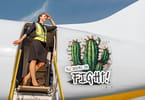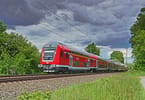Getting to Know the Mediterranean Farmers. The Oasi di Francesca farm-stay hotel is situated in an unlikely spot here in Sicily, about a kilometer from an Italian naval air base and a half hour to the large port city of Catania in the east, facing the Ionian Sea. Among the acres of low-lying artichoke plants — as well as pigs, sheep, horses, donkeys, chickens, cats and dogs — the military base is within view of the salmon-colored two-story inn. Due east, Mount Etna, active and soaring two miles high, is obvious despite low clouds.
It is not the sight of a major military base or even brooding black Etna why you may want to detour to this four-year-old inn, where the Galati family — Francesca, the momma (or Nonna); her two sons, daughter, daughter-in-law and four-month-old grandson — live, farm and run a tourism business that is part of Italy’s agriturismonetwork (although Oasi does not use the official trademark in its advertising).
Business is hard, said Sebastiano, one of the sons, speaking Italian with bits of English thrown in, using his hands to indicate the up-and-down cycle of making a hotel and a farm prosper with only a small family and other help, including a chef who does not like to cook artichokes.
“I love the work, the green, this is my life,” Sebastiano said, when asked whether the toil of farming and innkeeping was worth it, emphasizing that there was nothing else he would contemplate doing.
The farm is set off a back road that the family suggests on the phone may be difficult to find — though the Waze app had no trouble getting us to Oasi. Passing other farms — many of them citrus groves — it was abundantly clear that agriculture in the central plains here and in the hills of Sicily is a revered undertaking.
Agriculture vies with tourism and fishing as the island’s mainstays, but we passed numerous designated industrial zones, including oil refineries, as well. Water scarcity is part of the farming culture with droughts emerging seasonally, notably in the summer, when daily daytime temperatures average about 72 degrees Fahrenheit. The Mafia apparently controls much of the water utilities, worsening the accessibility to fresh water for Sicilians.
Runoff from Mount Etna provides relief for much of the island, but climate change has led to rising average temperatures and dropping rainfall. Diversification of farming through agritourism may help offset some of the challenges, although such information is hard to obtain from local officials.
The work of the Galatis — Francesca’s husband died years ago — is nearly round the clock, requiring the family and the farmhands, who speak absolutely no English, to nurse the artichoke plants to full production; to keep the sty replenished; to groom and care for the horses; to feed the chickens (who roam the property randomly); and do whatever else it takes to make Oasi feasible.
As Nonna, who also spoke no English, conveyed at breakfast, serving us cappuccino as we spread butter on our toast of homemade bread, it’s a struggle from dawn to late at night. She used her arms to make a sweeping motion, indicating how much it cost and how much work it took to hold on to the land and reap a livelihood from it.
As agritourism expands in many regions of the world, offering people who barely glimpse a farm let alone understand how it functions, the industry is turning agriculture into a more diversified business. Such “green travel” can help save tracts of land from shifting to more industrial and polluting uses, thereby degrading the environment as the planet succumbs to hotter and hotter temperatures.
Agritourism can also help alleviate poverty, supplementing income for farmers and providing employment for local people while preventing further flocking to cities, yet it is no panacea.
In Sicily, farm stays help lure travelers in the fall and spring to counter the summer hordes. It was in Taormina, the famous cliffside city in northeast Sicily, where the Group of 7 leaders met last summer and where the president of the United States refused to budge on his decision to leave the Paris climate agreement.
In Italy, where agritourism originated in the 1980s, the market is now regulated, with requirements to using the “agriturismo” label, such as 51 percent of the income must come from farming, and a farmer must run the business, receiving tax incentives along the way. Sicily’s 9,900 square miles extend from the sea to the interior to the sea with varying sizes of cities, towns and villages creating a range of scenery, including rolling farmscapes.
In 2016, the number of authorized agritourism farms in Sicily numbered 759, up from 705 in 2015, according to Istat, the national statistics bureau. Tourist accommodations in farm inns, which can be simply lodging with food service, totaled 12.1 million visitors in 2016 in Italy, up about 7 percent from 2015.
The bureau says that 36 percent of agritourism farms in Italy are managed by women — Nonna at Oasi is one example — with most of the growth in the industry occurring in the south and the islands, like Sicily.
The Galatis greet visitors as if they are long-lost relatives. We pulled up in our rented Fiat after touring other parts of Sicily for a week, curious to spend the night on a farm and pay our dues to the environment, but we had little insight into what staying on a farm as paying guests meant. The website says there is sport fishing, horseback riding, mountain biking and archery but no mention of cleaning stalls.
The winding, potholed back route to Oasi, which is shielded from the allee-like road by cypress trees, Etna looms like a simmering pyramid. The notion of spending a night on a farm on an island that we still barely understood brought on a case of jitters as we passed farm after farm, some gated entrances shut, wondering if we had made a mistake in going on this venture after stays in more conventional places in Sicily.

Giuseppe, a farmhand, at the end of the day.
Would we need to pitch in with farm chores, an invigorating idea, and dig in with the farmers at a banquet afterward, Bruegel style? Or could we tour the fields on our own, how we wandered through the remains of a fourth-century Roman villa — and Unesco World Heritage site — the day before, in Piazza Armerina?
Even when we got out of the Fiat, parking in the white-gravel lot near the 10-room villa-style hotel, we headed toward the front door with wariness as a mangy old white dog lifted his tail in half-jest and a terrier strode over, sharp and barky. Charlie, we were told, was in charge.
Consuela, her brother Sebastiano and his wife, Elena, ushered us in to the wood-and-stucco interior and up to our small, spare room (which cost about $90, including breakfast). We opened the balcony shutters and windows to air out the space, calling hello to a crew of horses and donkeys grazing in a pasture below.
We quickly explored the outdoors, walking the caked paths running through the endless rows of dark-leafed artichoke plants, mystified as to what they were at first but impressed by their healthy appeal. (It was Giuseppe, a farmhand, who told us it was carciofi, holding a stray up as an example, the season done.)
Around the bend, the hogs barely looked up from their open sty, grunting in the mud through the tail-end of the warm afternoon as piglets scrambled about, bumping into one another like pinballs, pausing for sustenance at a sow’s teats, tugging rapaciously. The sheep darted from one side of their neighboring pen to the other — clustering under a bunch of palm trees — terrified by New Yorkers making sheep noises to get their attention. (The sheeps’ milk produces the farm’s ricotta.)
It didn’t take long to realize that the Galatis’ business of farming and accommodating guests to offer do-goodism-adventure looks as arduous as we thought. No one goes into farming and hotelkeeping for the downtime. Yet the Galatis’ determination to make a go of agritourism in a summery island where thousands of European and Americans land every year is not that hard to accept. The weather is fine, the wine flows, olives ripen on silvery branches and life appears to be beautiful.
The Oasi on the first floor is taken up mostly by a square dining room, with a wood-beamed ceiling and tables covered in red tablecloths and matching wood chairs. The “family style” food is served for breakfast, lunch and dinner. We moseyed to the dining room about 7:30, surprised by the presence of many other diners: nearly all men, who, we figured, came from the naval base, Sigonella. Consuela told us, however, that the guests at one table, where five middle-aged men ate their dinner in religious silence while drinking red Sicilian wine at a placid pace, came from Catania.
It was the military diners — Americans — who fascinated us, given that Sigonella is also home to a US drone operation launching sorties to kill ISIS in Libya and was used in 2011 by the NATO coalition, authorized by the United Nations Security Council, to obliterate Muammar el-Qaddafi, also in Libya.
The three American men and one woman near us talked shop — bantering military-speak that felt as foreign as the Sicilian dialect. Yet they ate and drank as if they happened to be enjoying a meal in a casual Italian restaurant in Brooklyn, N.Y., where the tables might also be covered in red cloths but the wine would not have been fermented at home.
Unlike other corners of Sicily, the menu was familiar Italian, homemade pastas with pesto or pomodoro sauce as well as veal, chicken and pork (presumably from the farm, though we didn’t have the courage to ask). Cannoli, stuffed with homemade ricotta, topped off the main courses, whose enormous portions took up whole plates.
Consuela, who made the pesto (she substituted almonds instead of the Sicilian pignoli nuts), brought over home-brewed limoncello liqueur for the military guests and us. It was a potent drink to be downed in one swig, a rich lode as easy to swallow as sweet cough syrup.
Later, I tried to eke out more information about Oasi from Consuela, who speaks a fair amount of English and lives part time on the farm and in Enna, a mountaintop city nearby. Like Sebastiano, Consuela said she could not imagine doing anything but working the farm and the inn, and I felt a tinge of envy despite the headaches of managing two full-time businesses at once.
She pointed to a photo on the wall of members of the Italian naval base, who ate at the restaurant on weekends. Underneath was a newer photo — a Spanish contingent that joined the base a year earlier to help, she said, with the migrant crisis at sea.
The Spaniards were also regulars at the restaurant, and “they like caponata even more than the Italians,” she noted, as if such news were heresy. (She also confided that the Americans did not like the fresh ricotta.)

Sightseeing at Oasi di Francesca includes watching the piglets forage in their sty, near the sows.
I was dying to ask her about the dozens of African migrants we had passed on a back highway on the route to Oasi earlier in the day. The Africans, all young men, appeared to be bicycling home after working in the groves alongside the road; possibly, they could have been forced into unpaid labor or low-paid work. The island has been inundated with migrants and refugees in the last several years: so far this year, more than 75 percent of the 145,3555 people who have made the voyage to Europe by sea arrived first in Italy, according to the UN migration agency.
Consuela — as was the case with all Sicilians I broached on the subject — diverted the conversation by saying the inn had bicycles too, if we wanted to try them. Her evasion seemed normal, part of the pattern that emerged when I questioned locals on how the island was coping with the influx of immigrants who arrived not so much to mainland Sicily but to the outer island of Lampedusa, a three-hour ferry ride away. Sicilians did not want to talk about the problem because, I gathered, they were afraid of scaring off tourists.
Yet that afternoon was the first time we saw African migrants en masse during our time in Sicily, and the sight of the young men, many wearing knit caps and down jackets as they bicycled against the wind on the flat curving road, brought their plight into stark view, and my role as passer-by turned into something more moving and profound — as the trek the men had managed to make to reach Sicily became both lifelike and surreal. It was unmistakable from the vigorous way they pedaled that their odyssey was not over in any way, shape or form.
Saying goodnight to Consuela, I went up to our room. The inn grew still by midnight as a half moon bit the center of the sky outside our balcony. Wide awake for hours, I listened to the range of funny noises as the farm slumbered, with reminders — horse hooves pawing the ground, a flycatcher swishing past — that we were all hunkered down on a lone island in the middle of the sea, some of us aching to see home.
Toward the middle of the night, a low-flying plane, surely from the base, joined the sounds, buzzing faintly as it circled and arced — not an irritating noise and even reassuring — surveilling, practicing, diving and rising: god knows.
SPOURCE: Dulcie Leimbach, UN Independent
WHAT TO TAKE AWAY FROM THIS ARTICLE:
- The Oasi di Francesca farm-stay hotel is situated in an unlikely spot here in Sicily, about a kilometer from an Italian naval air base and a half hour to the large port city of Catania in the east, facing the Ionian Sea.
- Business is hard, said Sebastiano, one of the sons, speaking Italian with bits of English thrown in, using his hands to indicate the up-and-down cycle of making a hotel and a farm prosper with only a small family and other help, including a chef who does not like to cook artichokes.
- It was in Taormina, the famous cliffside city in northeast Sicily, where the Group of 7 leaders met last summer and where the president of the United States refused to budge on his decision to leave the Paris climate agreement.





















